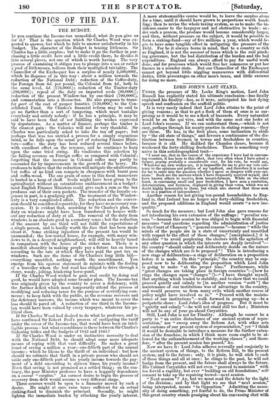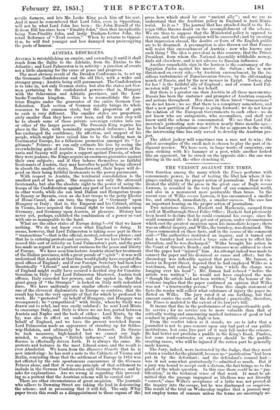LORD JOHN'S LAST STAND.
UNDEn the pressure of Mr. Locke King's motion, Lord John Russell has explicitly stated his ultimate conclusion—has finally explained his finslity—ha4, as it were, anticipated his last dying speech and confession en the scaffold politic.
It is very rarely indeed that Lord John attains to the point of giving reasons ; so that to get a flock of them at once is as sur- prising as it would be to see a flock of buzzards. Every naturalist would be on the qui vive, and with the same zest one looks at Lord John's reasons. If we can understand them,—which is not easy, perhaps through his scanty practice in stating reasons,—they are these. He has, in the first place, some inclination to abide by "the old state of things," and favours a continuance of the dis- tinction between freemen in towns and freeholders in counties, because it is old. He disliked the Chandos clause, because it weakened the forty-shilling freeholders. There is something very naive in this autobiographical trait—. "I must say, that in the course of the experience I have had in canvass- ing counties, it has been to this effect, that very often when I have asked a farmer, paymg probably a considerable rent, for his vote, he would say, 'Whatever my, own wishes are, it is impossible for me to give my vote con- trary to the opinions and politics of my landlord, and therefore it is useless for me to enter into the question whether I agree or disagree with your opi- nions.' Such are the answers which I have frequently received myself, and have known others to receive, from tenant-farmers. While on the other hand, in canvassing small and poor freeholders, I have seen a resolution, determination, and firmness, displayed in giving their votes, which was no doubt highly honourable to them, but which also showed that those men were in a position of independence." Another reason for not giving ten-pound householders to Eng- land is, that Ireland has no longer any forrhillieg freeholders, and the proposed additions in England would create " a new ine- quality." So much for the measure ; but Lord John also gave reasons for not introducing his own extension of the suffrage : "peculiar rea- sons "—because this session he was obliged to begin with financial measures "and questions regarding the administration of justice in the Court of Chancery "; " general reasons "—because " while the minds of the people are in a state of uncertainty and unsettled with respect to the effect of these changes," [unexplained,) it is desirable " to avoid perplexing the electors with the agitation of any other question in which the interests are deeply involved"— the country "should calmly and deliberately decide on the nature of the changes which are to be proposed" ! This is introducing a new stage of deliberation—a stage of deliberation on a proposition before it is made. On this " principle," the country may be sup- posed now to be deliberating the proposition which Lord John is going to make " at the proper time." Furthermore, while "great changes are taking place in foreign countries "—[how he rings the changes upon " changes " !]--" I have thought myself, that anything which tended to stability, and to show that we could proceed quietly and calmly to [in another version " ?vial the maintenance of our institutions was of advantage to the country, and would preserve us from many evils which another course of policy might have involved us in." "Proceed with the mainte- nance of our institutions "—walk forward in propping up—be a peripatetic shore : Lord John's idea of progress. But it must be " quietly and calmly "—he will not stand still too fast ; Ministers will not be any of your go-ahead Caryatides. Still, Lord John is not for Finality. Although he cannot be a party to " an entire disturbance of our ancient system of repre- sentation," nor " sweep away the Reform Act, with other acts and customs of our present system of representation," yet "I think it would be desirable to introduce a measure for the further exten- sion of the franchise, in which I think more room ought to be al- lowed for the enfranchisement of the working classes"; ; and there- fore, " after the present session has passed," f&c. Now we have it : Lord John adheres severally and conjointly to the ancient system of things, to the Reform Bill, to the present system, and to the future; only, it is plain, he will stick to each of those things and all at once : he clings to the past, he will not budge from the present, and the future shall always be the future. His Cabinet Caryatides will not even " proceed to maintain" with too fervid a rapidity, but ever "building on old foundations," will consent to take up the repairing trowel—next session.
"Next session " ? Ay, but we must read the debate by the light of the division; and by that light we see that "next session," being interpreted, means "in Opposition." Admitting the neces- sity of doing something, yet fearful to do, the Prime Minister of this great country stands gossiping about his canvassing chat with servile farmers, and lets Mr. Locke King push him off his seat. And it must be remembered that Lord John, even in Opposition, will not be what Lord John has been : the John Russell of the Reform Bill has since been "Finality John," then that inexplicable being Non-Finality John, and lastly Durhnm-Letter John, the retail Reformer of "Next session." When he returns to Opposi- tion, he will find younger and less damaged men preoccupying the posts of honour.



























 Previous page
Previous page